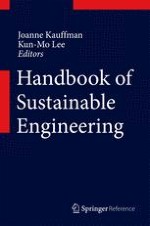Abstract
Engineering is about designing efficient products, processes, and systems. But if it is not so clear which products, processes, or systems will provide the most sustainable solutions to the current challenges, engineering efficiency is a dangerous thing as the wrong things might be designed efficiently, which might make things worse at the end! The question is what to design to contribute to SD.
Raising this issue might easily lead to a long treatise of definitions of SD. But clearly SD is an issue that depends on place and time: Contagious diseases, suppression, and starvation were for long the most pressing sustainability issues. Now resource depletion, climate change, and inequity appear to be much more important articulations of sustainability.
To work as an engineer on the whole concept of SD is too encompassing. More specific articulations of SD, like “energy efficiency,” “zero waste,” and “accessible for all” could be guiding principles for engineering design. However, one should be aware not to identify one single SD articulation as the essence of sustainability. Various articulations of SD always play a role, and dilemmas between these SD articulations might occur.
A fundamental question is whether an engineer, by consciously altering a design to make it contribute more to SD, can change the main stream of technology in a sustainable direction. Many attempts to change the main stream of engineering design failed. Can anybody actually influence the course of technology, or are engineers forced to move along in the mainstream of techno-scientific progress? For long, this has been a heavily debated issue in the history and philosophy of technology.
There are various mechanisms that limit designers from successfully introducing radically new designs. However, under some specific conditions, radically new technological options might be rapidly introduced. Can these transitions be stimulated and managed: Can large-scale and radical socio-technical systems changes be guided in desired directions? Or do these historic transitions just happen more or less coincidentally?
Development of new technologies is no longer an individual endeavor. The time of the great inventors is over. An innovation takes not just research and design, but also well educated staff, entrepreneurial facilities, adjacent technologies, market development, and political support. The technological innovation systems approach systematically analyzes what it takes to produce innovations and be regionally successful with it. Currently, various regions of the world aim at becoming the high-tech area that produces the solutions for climate change and the energy crisis. Which regions will be the winners that are able to produce the sustainable technologies of the future?
